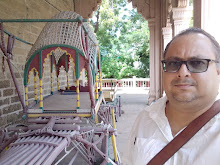
By
Ravi Deka
My father had a deeply irritating habit. Any subject I picked up, he had to follow. But first, he would patronize me - Astrology, Buddhism, tantra, Jung or whatever I was reading. Suddenly my books became his, and soon he the “expert.” The only things he didn’t chase me into were Taoism, motorcycle repair, and boat building.Our approaches differed. I collected books, skimmed, dropped them when bored, filing fragments away in the chaotic, multithreaded system of a dyslexic ADD brain. He, on the other hand, would first criticize the author, then read cover to cover, make notes, study further, and inevitably write an article—say, on Tibetan Buddhism’s effect on Shankardeva’s Vaishnav tradition. We rarely agreed: his pedantic stance was dogmatic, while I followed Lao Tzu—“the further one goes, the less one knows.”
Still, one explanation of his stayed with me: the difference between a Bodhisattva and an Arhat - both are realized masters in their respective Buddhist traditions. A Bodhisattva, he said, seeing goats led to slaughter, would lecture the herders on the sanctity of life, their sins, and the karma. A Theravadin Arhat, by contrast, may chat with the herders, bless them if asked, perhaps request kindness to the animals while they are alive, then move on, knowing people must eat and survive. Having somewhat known both streams from inside, I think his was the best distinction I’ve ever heard.
Still, one explanation of his stayed with me: the difference between a Bodhisattva and an Arhat - both are realized masters in their respective Buddhist traditions. A Bodhisattva, he said, seeing goats led to slaughter, would lecture the herders on the sanctity of life, their sins, and the karma. A Theravadin Arhat, by contrast, may chat with the herders, bless them if asked, perhaps request kindness to the animals while they are alive, then move on, knowing people must eat and survive. Having somewhat known both streams from inside, I think his was the best distinction I’ve ever heard.
Of course, I had to add dryly that he forgot the Tulkus - reincarnated Lamaist Bodhisattvas who would chant, bang drums and gongs, blow a horn blessing both herders and goats, to protect them from demons and then have one for their meal. “Give me the wandering Daoist any day,” I said. He would stop by, share banter, eat what was offered, drink their booze or his own, laugh and move on, following the Dao.
“In China we call them piànzi -cheats,” said Chen, my hosting company’s liaison, when I shared my fascination with the "Dao Tses," Taoist sages. Making me realize that our people weren’t so different after all - at least in their views about travelling mendicants.
That evening, in a bar, Chen pressed me about why an Indian is interested in Daoist thought, when it's been long ignored in China except for perfunctory temple rituals. What followed was hours of my drunken stream of consciousness - Daoist parables, Iching cosmology, Chuang Tzu quotes, reflections on “the Way.” A fascinated audience gathered, some catching my English, others listening to Chen’s translations.
In true Daoist style, the language barrier and the booze only thickened the mystic veil.
Years later, I visited the city again. Chen had left the company, and his replacement took me around. On seeing my interest in a wayside Taoist shrine, his face lit up in recognition:
“Ooo...so you are the Dao Tse from Indu!
I heard much about you!”
As a follower of the Way, I didn’t ask what.
I heard much about you!”
As a follower of the Way, I didn’t ask what.
- Get link
- X
- Other Apps
- Get link
- X
- Other Apps

Comments